人教版(2019)必修第二册 Unit 4 History and Traditions 单词课件(共45张PPT)
文档属性
| 名称 | 人教版(2019)必修第二册 Unit 4 History and Traditions 单词课件(共45张PPT) |
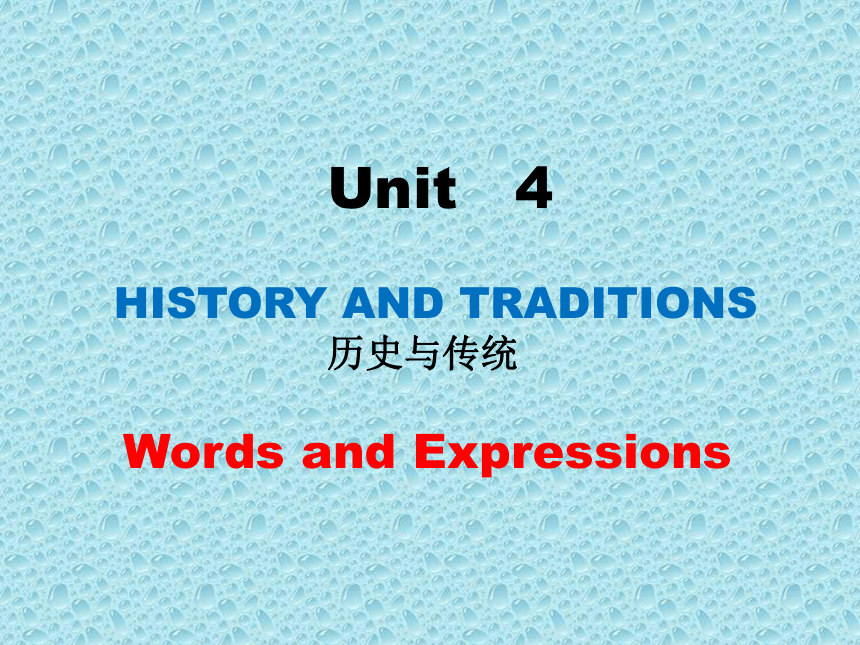
|
|
| 格式 | pptx | ||
| 文件大小 | 301.3KB | ||
| 资源类型 | 教案 | ||
| 版本资源 | 人教版(2019) | ||
| 科目 | 英语 | ||
| 更新时间 | 2024-08-23 12:18:08 | ||
图片预览

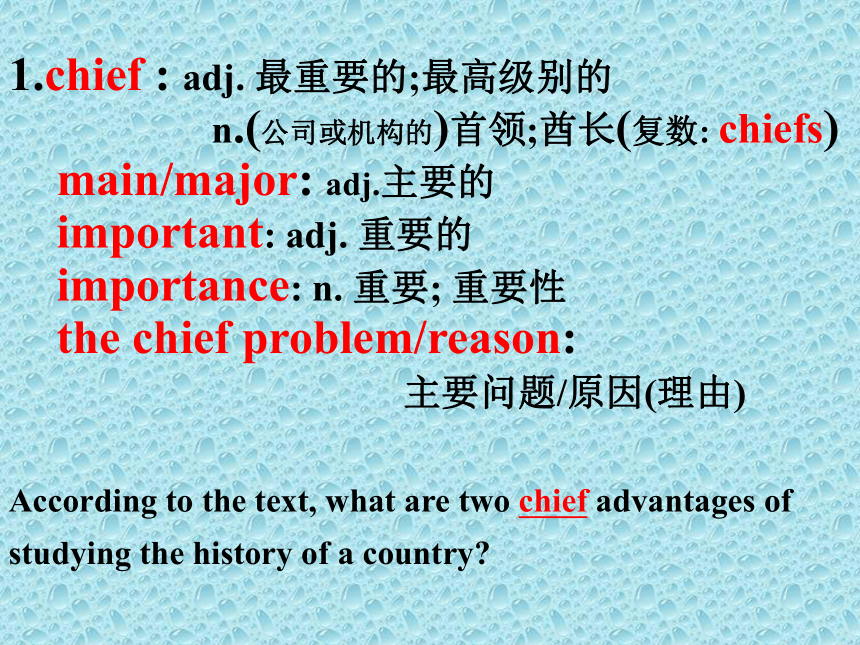

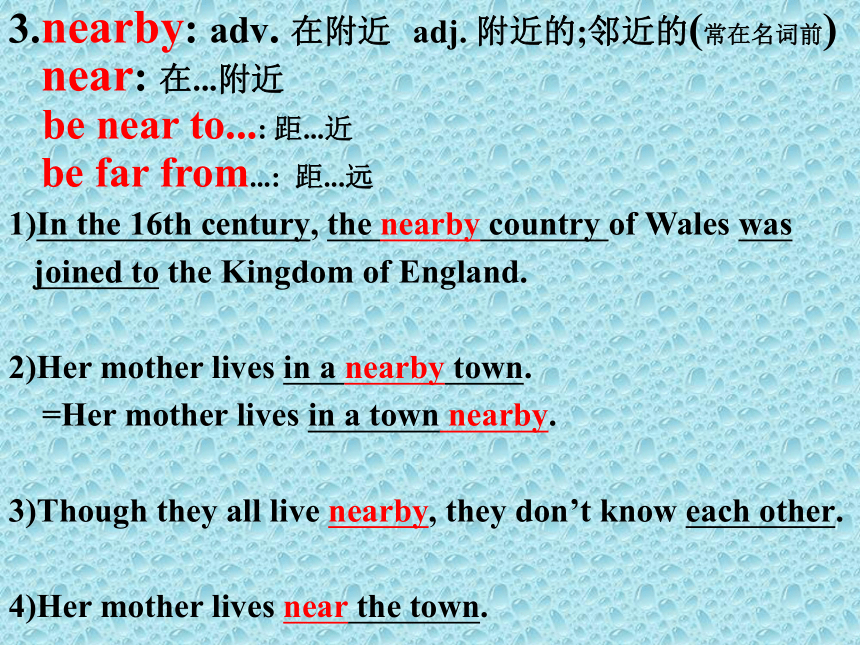
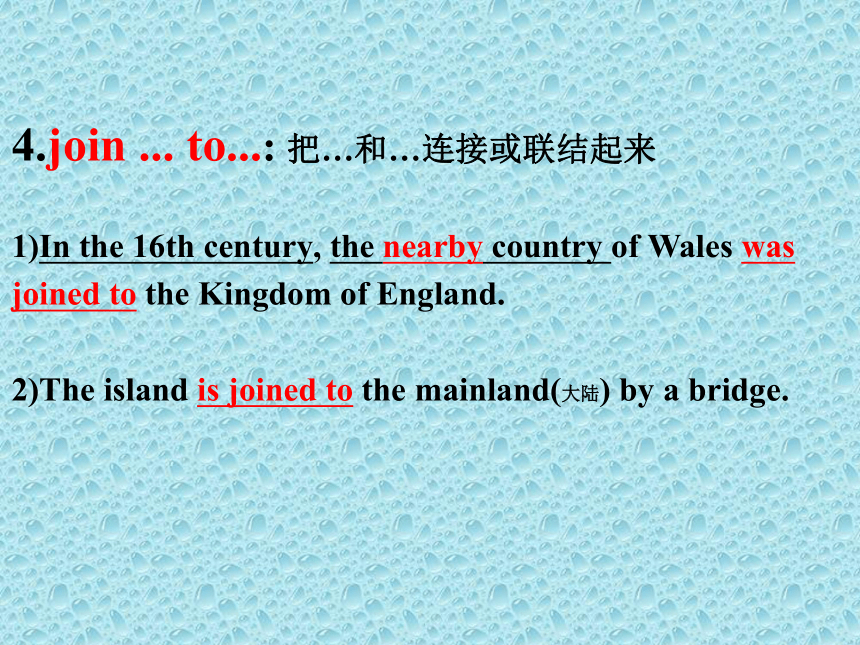
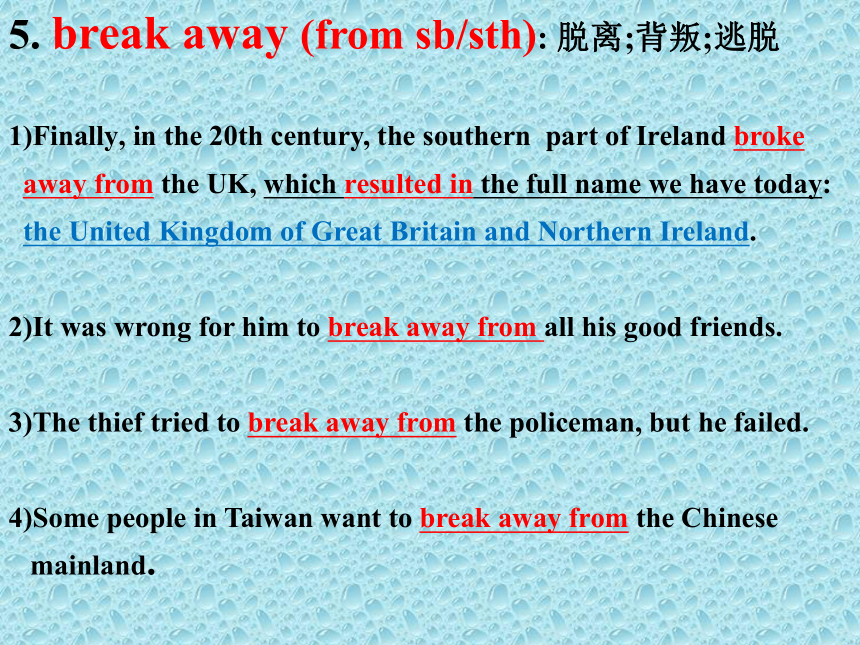
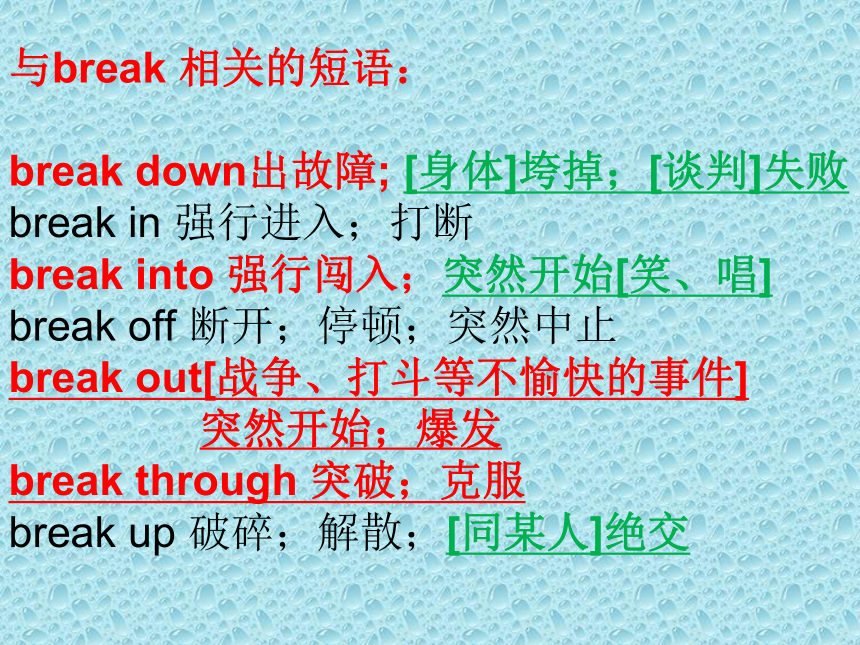
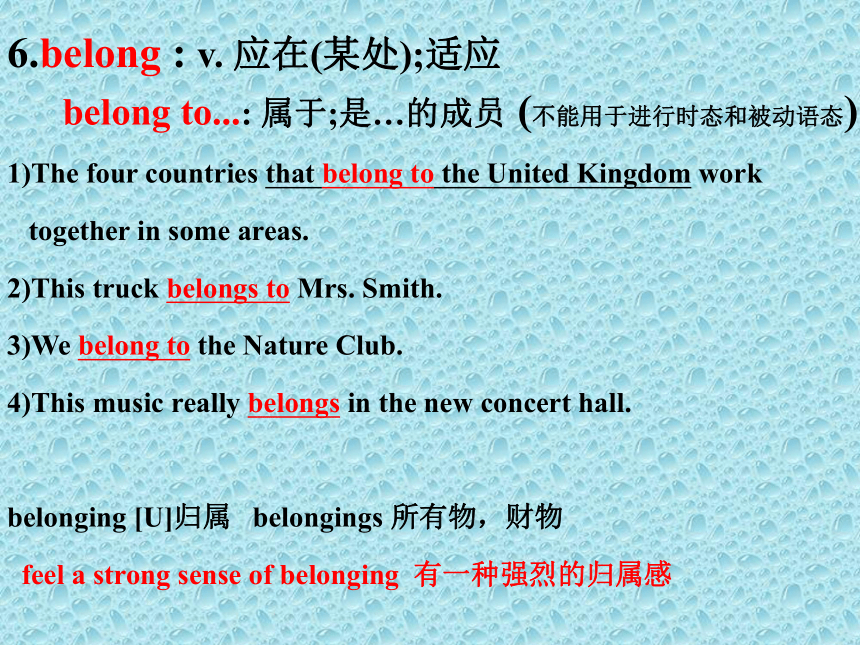
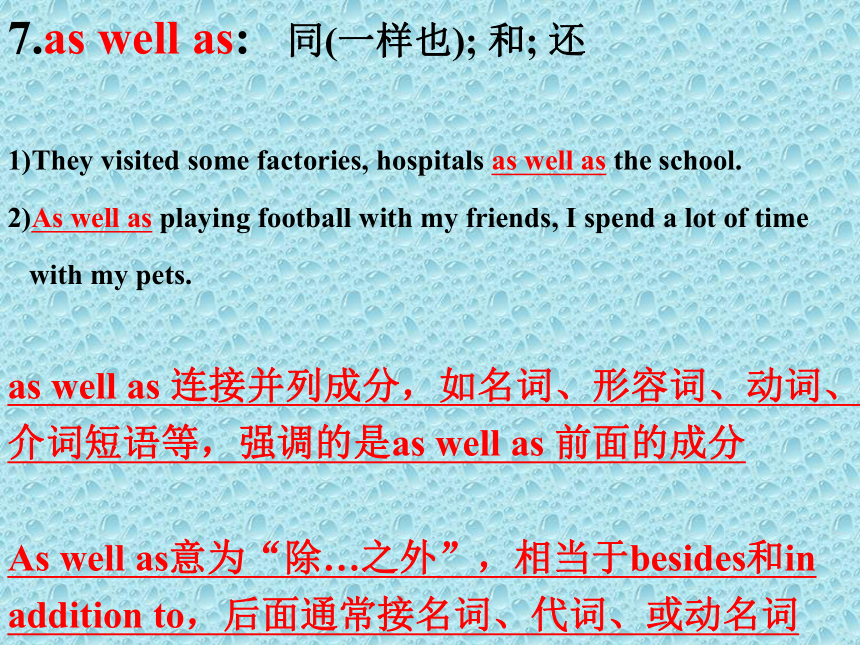
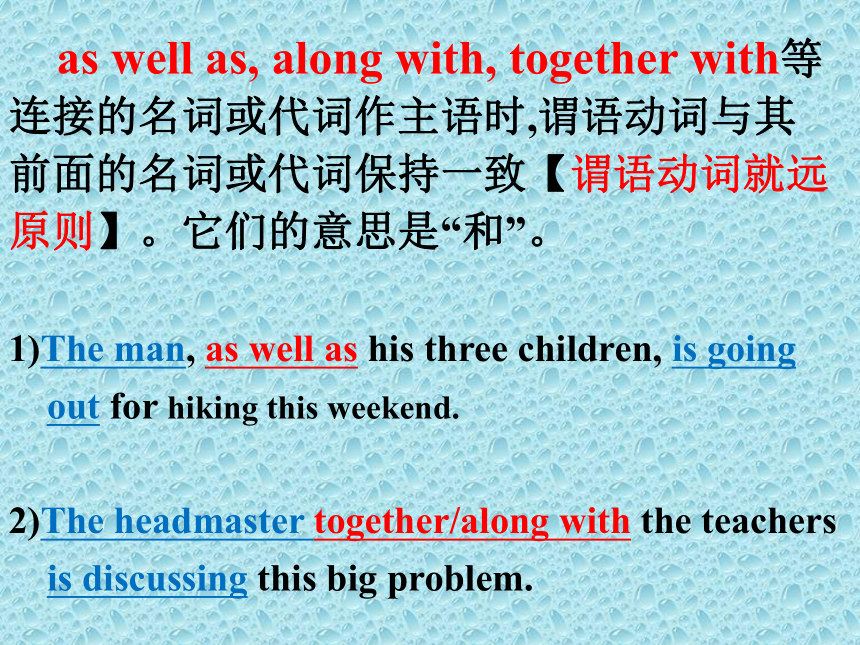
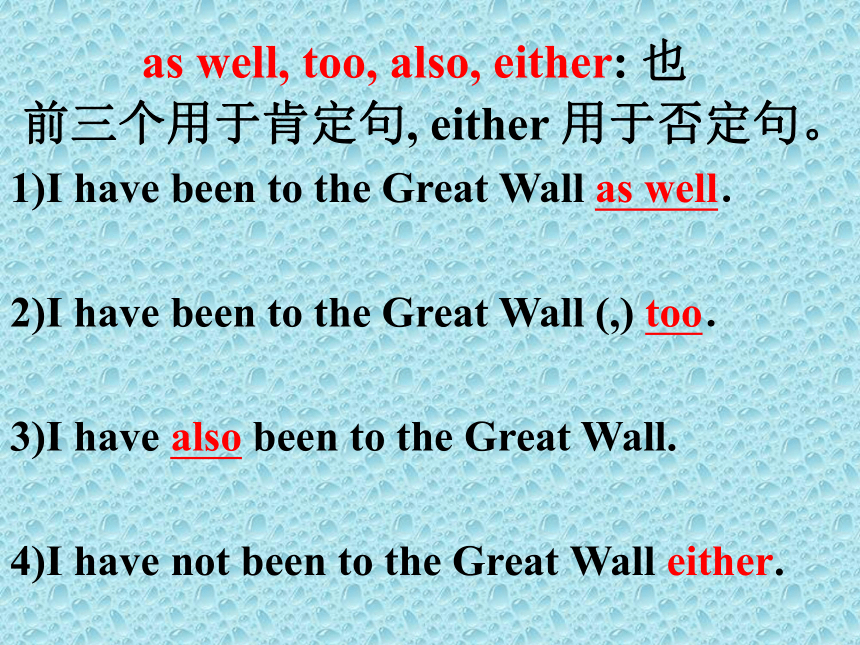
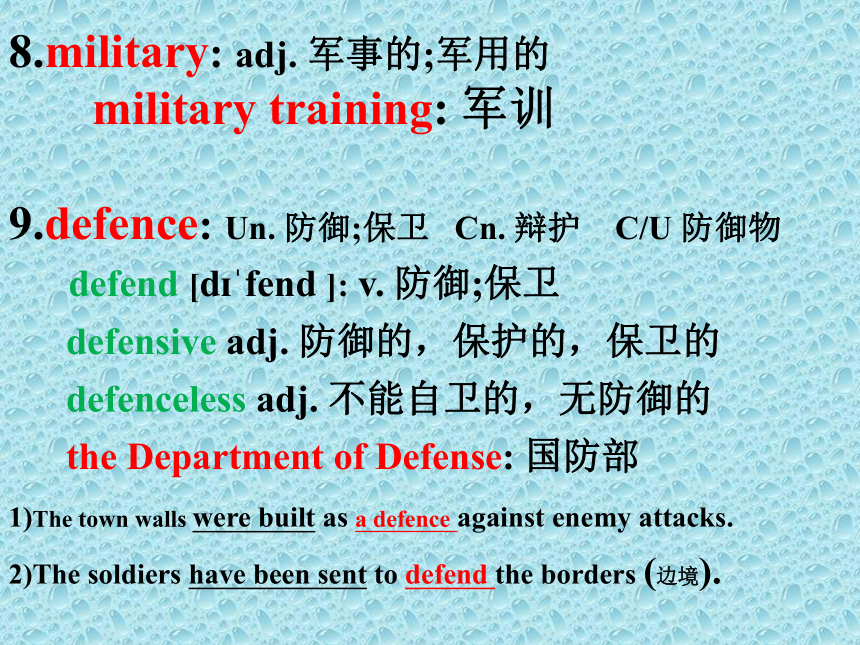
文档简介
(共45张PPT)
Unit 4
HISTORY AND TRADITIONS
历史与传统
Words and Expressions
1.chief : adj. 最重要的;最高级别的
n.(公司或机构的)首领;酋长(复数: chiefs)
main/major: adj.主要的
important: adj. 重要的
importance: n. 重要; 重要性
the chief problem/reason:
主要问题/原因(理由)
According to the text, what are two chief advantages of studying the history of a country
2.puzzle : n. 谜;智力游戏;疑问 v. 迷惑;使困惑
a word puzzle: 字谜
puzzling: adj. 令人迷惑的/困惑的
puzzled: adj. (人感到)困惑的;迷惑不解的
be puzzled about sth: 对某事迷惑不解
1)What puzzles him is why that movie is so popular.
2)These problems will puzzle the scientist.
3)These problems are puzzling.
4)The scientist is puzzled about these problems.
5)She had a puzzled look on her face.
3.nearby: adv. 在附近 adj. 附近的;邻近的(常在名词前)
near: 在...附近
be near to...: 距...近
be far from...: 距...远
1)In the 16th century, the nearby country of Wales was
joined to the Kingdom of England.
2)Her mother lives in a nearby town.
=Her mother lives in a town nearby.
3)Though they all live nearby, they don’t know each other.
4)Her mother lives near the town.
4.join ... to...: 把…和…连接或联结起来
1)In the 16th century, the nearby country of Wales was joined to the Kingdom of England.
2)The island is joined to the mainland(大陆) by a bridge.
5. break away (from sb/sth): 脱离;背叛;逃脱
1)Finally, in the 20th century, the southern part of Ireland broke
away from the UK, which resulted in the full name we have today:
the United Kingdom of Great Britain and Northern Ireland.
2)It was wrong for him to break away from all his good friends.
3)The thief tried to break away from the policeman, but he failed.
4)Some people in Taiwan want to break away from the Chinese
mainland.
与break 相关的短语:
break down出故障; [身体]垮掉;[谈判]失败
break in 强行进入;打断
break into 强行闯入;突然开始[笑、唱]
break off 断开;停顿;突然中止
break out[战争、打斗等不愉快的事件]
突然开始;爆发
break through 突破;克服
break up 破碎;解散;[同某人]绝交
6.belong : v. 应在(某处);适应
belong to...: 属于;是…的成员 (不能用于进行时态和被动语态)
1)The four countries that belong to the United Kingdom work
together in some areas.
2)This truck belongs to Mrs. Smith.
3)We belong to the Nature Club.
4)This music really belongs in the new concert hall.
belonging [U]归属 belongings 所有物,财物
feel a strong sense of belonging 有一种强烈的归属感
7.as well as: 同(一样也); 和; 还
1)They visited some factories, hospitals as well as the school.
2)As well as playing football with my friends, I spend a lot of time
with my pets.
as well as 连接并列成分,如名词、形容词、动词、介词短语等,强调的是as well as 前面的成分
As well as意为“除…之外”,相当于besides和in addition to,后面通常接名词、代词、或动名词
as well as, along with, together with等
连接的名词或代词作主语时,谓语动词与其
前面的名词或代词保持一致【谓语动词就远原则】。它们的意思是“和”。
1)The man, as well as his three children, is going
out for hiking this weekend.
2)The headmaster together/along with the teachers
is discussing this big problem.
as well, too, also, either: 也
前三个用于肯定句, either 用于否定句。
1)I have been to the Great Wall as well.
2)I have been to the Great Wall (,) too.
3)I have also been to the Great Wall.
4)I have not been to the Great Wall either.
8.military: adj. 军事的;军用的
military training: 军训
9.defence: Un. 防御;保卫 Cn. 辩护 C/U 防御物
defend [d fend ]: v. 防御;保卫
defensive adj. 防御的,保护的,保卫的
defenceless adj. 不能自卫的,无防御的
the Department of Defense: 国防部
1)The town walls were built as a defence against enemy attacks.
2)The soldiers have been sent to defend the borders (边境).
in defence 保卫,防守
in defence of 为了保卫…
in sb’s defence/in defence of sb 为某人辩护
defend sb/sth from/against… 保卫…免受…
defend sb from/against… 针对…为某人辩解
10.legal ['li:ɡl]: adj. 法律的;合法的
legally: adv. 法律上;合法地
illegal [ li:gl]: adj. 不合法的;违法的
illegally: adv. 不合法地
law: n. 法律
Everyone must earn money in the legal way.
否定前后缀-【in- im- un- dis- -less il-】
11.surround v. 围绕;包围
surrounding: adj. 周围的;附近的
surroundings: n.环境;周围的事物
in…surroundings 在…的环境中
surround … with… 用…包围…
be surrounded with/by…: 被…围绕/包围
1)The police have surrounded the office building.
2)The lake is surrounded with/by trees.
12.evidence : Un. 证据;证明
【不可数名词: 前面不能加an/a, 后不能加s】
1)Almost everywhere you go in the UK, you will be
surrounded by evidence of four different groups of
people who took over at different times throughout
history.
2)We have no evidence to support the case.
13.achievement [ 't i:vm nt]: n.
成就;成绩;达到
achieve : v. 取得; 获得; 实现; 成功
1)Some of their great achievements included
building towns and roads.
2)They are proud of their children’s
achievements.
3)We must work hard to achieve our goals.
14.location: n. 地方;地点;位置
locate : v. 使位于;确定准确地点
destination: n. 目的地
be located in/at/to…: 位于;坐落在
1)The Vikings came in the eighth century,
left behind lots of new vocabulary, and also
names of many locations across the UK.
2)It is a suitable location for a new airport.
3)The factory is located at the foot of a hill.
15.keep your eyes open (for...): 留心;留意
1)If you keep your eyes open, you will be surprised
to find that you can see both its past and its present.
2)While you are checking the animals, keep your eyes open for any signs of disease.
catch one’s eyes 引起某人注意
fix/keep one’s eyes on 注视,盯着看
have an eye for… 对…有鉴赏力[识别力,眼力]
keep an eye on 照看,留神,留意
kook sb in the eye[s] 直视某人,正视某人
16.charge : v. 收费; 指控; 主管;充电 n. 主管; 收费;主管
charge[…] for[…] [向…] 受…的费用
free of charge: 免费=for free get charged: 受指控; 充电
charge the cellphone/battery:给手机/电池充电
charge sb with…: 指控
charge sb with[doing]sth=accuse sth of[doing]sth
控告/指控某人[做]某事
charge[sb.] sth [for sth] [因某事][向某人]收费
take charge of…: 负责; 主管
be in charge of…: 负责; 主管【主语为人】
be in the charge of…: 由…负责/主管【主语为物】
1)The project(工程) is in the charge of
Mr. Wang.
2)Mr. Wang is in charge of the project.
3)He took charge of the factory after his
father’s death.
17.announce : v. 宣布;[通过广播]通知;声称
announce sth to sb=announce to sb sth
【此搭配形式同explain】向某人宣布某事
it announced that从句 据宣布….
announcement : Cn. 通告;宣告;公告 Un.宣布
make an announcement 发表公告
announcer Cn. 广播员,播音员
1)When we finally reached the service desk to ask for audio guides, we heard it
announced that there were no audio guides left.
2)The government announced that they would build a new highway to the
mountain.
18. amount: n. 金额;数量
quantity: 数量
quality: 质量
a large amount of = large amounts of 大量
1)She needs that amount of money to survive.
2)He has a large amount of /large amounts of work to do every day.
大量
a large amount of + 不可数名词 + 单动
large amounts of + 不可数名词 + 复动
1)A large amount of water has been polluted.
2)Large amounts of water have been polluted.
19.gallery: n. 展览馆;画廊
an art gallery: 美术馆
the National Gallery: 国家美术馆
1)We found ourselves very surprised by the large number of visitors and the amount of noise at the entrance of the national Gallery.
2)Her pictures are on display at the art gallery.
20.approach Cn.方法;途径; 道路 Un.靠近;接近;
v. 接近; 接洽; 着手处理; 靠近
an approach to (doing) sth…:(做) 什么的方法;通往…的道路
the approach of… …的来临/临近
a method of/for (doing) sth…: (做) 什么的方法
with this method 通过这种方法
a way of doing/to do sth…: 做什么的方法
in this way 用这种方法
a manner of doing sth…: 做什么的方法
in a…manner 用…的方法
by means of … 借助…手段;依靠…的方法
1)It was hard to approach the painting as
there were so many people around.
2)As you approach the city, you’ll see the
university on the right.
3)We will explore different approaches to
gathering information.
4)We will adopt different approaches to
(solving) the problems.
5)Winter is approaching.
6)The bank has approached the problems
in different ways.
21.ensure/insure : v. 保证;确保;担保=make sure
1)She had a copy of the painting boxed to
ensure that it was delivered safely.
2)Your good plan has ensured our success.
3)I will ensure that the car arrives at the
station by seven o’clock.
4)Please ensure/make sure that all the lights
are turned off when you leave the hall.
22.landscape [ l ndske p]:n. (陆上/乡村的)风景
view: n. 景色;风景
scenery: n. 风景;景色
sight: n. 风景;景象
enjoy the ...: 欣赏风景
watch/see the ...: 看风景
23.generous : adj. 慷慨的;大方的;丰富的
generosity Un. 慷慨,大方
generously adv. 慷慨地,大方地
be generous with sth.在某方面慷慨大方
be generous to sb.对某人慷慨大方
be generous in doing sth 乐于做某事
It is generous of sb. to do sth某人做某事真是大方
The old couple are always generous to the poor people.
He is generous with his money. 他不吝啬金钱
She is generous in giving help. 她乐于助人
It was generous of him to contribute a lot of money to the rural schools. 他很慷慨,为乡村学校捐了很多钱。
24.ancestor : n. 祖宗;祖先
descendant: n. 后裔;后代;子孙
generation: n. 一代; 一辈
1)The family’s ancestors once attended to
soldiers who were wounded in the First World War.
2)My ancestors came from Guizhou Province.
25.position : v. 安装;安置;使处于n. 位置; Cn.职位; 姿态;地方
in place/position: 在合适的地方
out of place/position: 不在合适的地方
in a…position[to do sth] [做某事]处于…的境地
1)You should put the medicines in position.
2)When I entered the office, I found all the books out of position.
3)The large television screen is positioned on the wall of the stadium.
4)From his position on the top of the hill, he had a good view of the city.
5)What would you do in my position
6)I would like to apply for the position of Sales Director.
26.eager : adj. 热切的;渴望的
eagerly: adv. 热切地;渴望地
eagerness n. 渴望,热切
be eager[for sb.] to do...: 渴望[某人]做某事
be eager for sth: 渴求[得到]某物
be eager that 从句 【从句用虚拟语气】 热切希望…
1)There were many eager persons outside (of) the stadium.
2)All the students in our class are eager to enter key
universities.
“渴望…”的其他表达
渴望获得某物 渴望做某事
be anxious for sth be anxious to do sth
be dying for sth be dying to do sth
be greedy for sth long to do sth
be thirsty for sth
long for sth
27.
make up 构成【部分组成整体,即主语是部分,宾语是整体】
1、构成,编造[故事、谎言],化妆
2、补上[失去的东西];
3、补偿,弥补[常与for搭配];make up for
4、和解,和好[常与with搭配] make up with sb
be make up of 由…构成=consist of=be composed of
【整体由部分组成,即主语是整体,宾语是部分】
28.more than
more than+名词 不仅仅,不只是
more than+数词 超过,多于
more than+形容词/副词 非常【相当于very和very much】
more than+从句 超出…的范围
“more than one+可数名词单数”意为“不止一个”,作主语时,谓语动词用单数形式
rather than 而不是[连接两个并列结构]
other than 除了…之外 [相当于except]
29.poet [ p t]: n. 诗人
poem [ p m]: n. 诗;诗歌(可数名词)
poetry [ p tri]: n.诗集; 诗歌; 诗作 (不可数名词)
30.county [ ka nti ]: n.(英国/爱尔兰)郡;
(美国的)县
country: 国家; 农村
countryside: 农村----in the countryside 在农村
The county has a population of 650,000 people.
31.feast: n. 盛宴;宴会;节日(宗教节日)
holiday: n.假期; 假日; 节日(尤指宗教节日或国家庆典日)
festival: n. 节; 节日
vacation: n. 假期
1)That evening they held a feast for their foreign friends.
2)Christmas is an important feast for some people in the west.
32.roll: v. (使)翻滚;(使)滚动; 翻转; 卷起来
n. 卷(轴); 翻滚; 卷形物;面包圈
a roll of paper/cloth: 一卷纸/一匹布
role : n. 角色; 作用
play a role/part in…: 在…中起作用/扮演角色
1)The car rolled down the hill.
2)The woman rolled up /down the window and drove on.
3)Let’s roll up our sleeves and work hard.
4)The dog had three rolls on the ground just now.
33.cattle [ k tl ]: n. 牛(牛的总称)(集合名词)
cow: n. 母牛; 奶牛
ox: 公牛(已阉割) (复数: oxen)
bull: 公牛(未阉割)
the Chicago Bulls: 芝加哥公牛队
a head of cattle: 一头牛
eighty head of cattle: 80头牛
cattle: 集合名词,前面不能加 a,词尾也不可
加s。常和many,these,those,the等连用。
用作主语时,句子的谓语动词多用复数。
34.ocean : n. 大海;海洋
the Arctic/Atlantic/Indian/Pacific Ocean:
北冰洋/大西洋/印度洋/太平洋
1)And down by the sea, the roar of the
ocean waves and cries of the seabirds
make up the music of the coast.
2)They may go hiking around the island,
or swimming in the ocean.
35.greet: v. 问候;迎接
greeting : n. 招呼;迎接; 祝词
a greeting card: 贺卡
1)On a quiet morning in the mountains,
feel the sun on your skin, and breathe
in the sweet scent of fresh flowers
while birds greet the new day with
their morning song.
2)She greeted all the guests warmly as
they arrived at her courtyard.
36.custom: n. 风俗;习俗;习惯
customs: n. 海关; 关税
customer : n. 顾客;主顾
habit: n. 习惯(通常指个人的习惯)
practice: n. 习惯; 习俗; 练习; 实践
1)And if you introduce yourself to a friendly
face, you are more than likely to experience
local culture and customs first-hand.
2)It is a traditional custom for Chinese old
people to live with their children and their
grandchildren.
37.sensory [ sens ri ]: adj. 感觉的;感官的
sense: n. 感官(即视觉、嗅觉、听觉、触觉、味觉)
the sense of sight/ smell/hearing/touch/taste: 视觉/嗅觉/听觉/触觉/味觉
sensory organs: 感觉器官
39.striking : adj. 引人注目的;显著的
strike : 罢工; 侵袭; 重创; 打; 碰撞;
打动; 敲钟; (钟)打点/报时
(strike -- struck --- struck/stricken)
1)A striking image. 引人注目的形象
2)There is a striking difference between Tom and Peter.
38.crowd : v.挤满;使拥挤 n. 人群;一群人;观众 ; 民众;
a crowd of/crowds of :一大群; 很多
crowd in (on sb): (想法/问题等) 涌上心头;涌入
crowd into sth: 大批涌入...
crowded : adj. 拥挤的; 挤满的
be crowded with...: 挤满…
1)I want to get there early to avoid the crowds.
2) Many uncomfortable thoughts were crowding in on her.
3)Millions of people have crowded into the center of the capital.
4)The park is always crowded with people every day.
Unit 4
HISTORY AND TRADITIONS
历史与传统
Words and Expressions
1.chief : adj. 最重要的;最高级别的
n.(公司或机构的)首领;酋长(复数: chiefs)
main/major: adj.主要的
important: adj. 重要的
importance: n. 重要; 重要性
the chief problem/reason:
主要问题/原因(理由)
According to the text, what are two chief advantages of studying the history of a country
2.puzzle : n. 谜;智力游戏;疑问 v. 迷惑;使困惑
a word puzzle: 字谜
puzzling: adj. 令人迷惑的/困惑的
puzzled: adj. (人感到)困惑的;迷惑不解的
be puzzled about sth: 对某事迷惑不解
1)What puzzles him is why that movie is so popular.
2)These problems will puzzle the scientist.
3)These problems are puzzling.
4)The scientist is puzzled about these problems.
5)She had a puzzled look on her face.
3.nearby: adv. 在附近 adj. 附近的;邻近的(常在名词前)
near: 在...附近
be near to...: 距...近
be far from...: 距...远
1)In the 16th century, the nearby country of Wales was
joined to the Kingdom of England.
2)Her mother lives in a nearby town.
=Her mother lives in a town nearby.
3)Though they all live nearby, they don’t know each other.
4)Her mother lives near the town.
4.join ... to...: 把…和…连接或联结起来
1)In the 16th century, the nearby country of Wales was joined to the Kingdom of England.
2)The island is joined to the mainland(大陆) by a bridge.
5. break away (from sb/sth): 脱离;背叛;逃脱
1)Finally, in the 20th century, the southern part of Ireland broke
away from the UK, which resulted in the full name we have today:
the United Kingdom of Great Britain and Northern Ireland.
2)It was wrong for him to break away from all his good friends.
3)The thief tried to break away from the policeman, but he failed.
4)Some people in Taiwan want to break away from the Chinese
mainland.
与break 相关的短语:
break down出故障; [身体]垮掉;[谈判]失败
break in 强行进入;打断
break into 强行闯入;突然开始[笑、唱]
break off 断开;停顿;突然中止
break out[战争、打斗等不愉快的事件]
突然开始;爆发
break through 突破;克服
break up 破碎;解散;[同某人]绝交
6.belong : v. 应在(某处);适应
belong to...: 属于;是…的成员 (不能用于进行时态和被动语态)
1)The four countries that belong to the United Kingdom work
together in some areas.
2)This truck belongs to Mrs. Smith.
3)We belong to the Nature Club.
4)This music really belongs in the new concert hall.
belonging [U]归属 belongings 所有物,财物
feel a strong sense of belonging 有一种强烈的归属感
7.as well as: 同(一样也); 和; 还
1)They visited some factories, hospitals as well as the school.
2)As well as playing football with my friends, I spend a lot of time
with my pets.
as well as 连接并列成分,如名词、形容词、动词、介词短语等,强调的是as well as 前面的成分
As well as意为“除…之外”,相当于besides和in addition to,后面通常接名词、代词、或动名词
as well as, along with, together with等
连接的名词或代词作主语时,谓语动词与其
前面的名词或代词保持一致【谓语动词就远原则】。它们的意思是“和”。
1)The man, as well as his three children, is going
out for hiking this weekend.
2)The headmaster together/along with the teachers
is discussing this big problem.
as well, too, also, either: 也
前三个用于肯定句, either 用于否定句。
1)I have been to the Great Wall as well.
2)I have been to the Great Wall (,) too.
3)I have also been to the Great Wall.
4)I have not been to the Great Wall either.
8.military: adj. 军事的;军用的
military training: 军训
9.defence: Un. 防御;保卫 Cn. 辩护 C/U 防御物
defend [d fend ]: v. 防御;保卫
defensive adj. 防御的,保护的,保卫的
defenceless adj. 不能自卫的,无防御的
the Department of Defense: 国防部
1)The town walls were built as a defence against enemy attacks.
2)The soldiers have been sent to defend the borders (边境).
in defence 保卫,防守
in defence of 为了保卫…
in sb’s defence/in defence of sb 为某人辩护
defend sb/sth from/against… 保卫…免受…
defend sb from/against… 针对…为某人辩解
10.legal ['li:ɡl]: adj. 法律的;合法的
legally: adv. 法律上;合法地
illegal [ li:gl]: adj. 不合法的;违法的
illegally: adv. 不合法地
law: n. 法律
Everyone must earn money in the legal way.
否定前后缀-【in- im- un- dis- -less il-】
11.surround v. 围绕;包围
surrounding: adj. 周围的;附近的
surroundings: n.环境;周围的事物
in…surroundings 在…的环境中
surround … with… 用…包围…
be surrounded with/by…: 被…围绕/包围
1)The police have surrounded the office building.
2)The lake is surrounded with/by trees.
12.evidence : Un. 证据;证明
【不可数名词: 前面不能加an/a, 后不能加s】
1)Almost everywhere you go in the UK, you will be
surrounded by evidence of four different groups of
people who took over at different times throughout
history.
2)We have no evidence to support the case.
13.achievement [ 't i:vm nt]: n.
成就;成绩;达到
achieve : v. 取得; 获得; 实现; 成功
1)Some of their great achievements included
building towns and roads.
2)They are proud of their children’s
achievements.
3)We must work hard to achieve our goals.
14.location: n. 地方;地点;位置
locate : v. 使位于;确定准确地点
destination: n. 目的地
be located in/at/to…: 位于;坐落在
1)The Vikings came in the eighth century,
left behind lots of new vocabulary, and also
names of many locations across the UK.
2)It is a suitable location for a new airport.
3)The factory is located at the foot of a hill.
15.keep your eyes open (for...): 留心;留意
1)If you keep your eyes open, you will be surprised
to find that you can see both its past and its present.
2)While you are checking the animals, keep your eyes open for any signs of disease.
catch one’s eyes 引起某人注意
fix/keep one’s eyes on 注视,盯着看
have an eye for… 对…有鉴赏力[识别力,眼力]
keep an eye on 照看,留神,留意
kook sb in the eye[s] 直视某人,正视某人
16.charge : v. 收费; 指控; 主管;充电 n. 主管; 收费;主管
charge[…] for[…] [向…] 受…的费用
free of charge: 免费=for free get charged: 受指控; 充电
charge the cellphone/battery:给手机/电池充电
charge sb with…: 指控
charge sb with[doing]sth=accuse sth of[doing]sth
控告/指控某人[做]某事
charge[sb.] sth [for sth] [因某事][向某人]收费
take charge of…: 负责; 主管
be in charge of…: 负责; 主管【主语为人】
be in the charge of…: 由…负责/主管【主语为物】
1)The project(工程) is in the charge of
Mr. Wang.
2)Mr. Wang is in charge of the project.
3)He took charge of the factory after his
father’s death.
17.announce : v. 宣布;[通过广播]通知;声称
announce sth to sb=announce to sb sth
【此搭配形式同explain】向某人宣布某事
it announced that从句 据宣布….
announcement : Cn. 通告;宣告;公告 Un.宣布
make an announcement 发表公告
announcer Cn. 广播员,播音员
1)When we finally reached the service desk to ask for audio guides, we heard it
announced that there were no audio guides left.
2)The government announced that they would build a new highway to the
mountain.
18. amount: n. 金额;数量
quantity: 数量
quality: 质量
a large amount of = large amounts of 大量
1)She needs that amount of money to survive.
2)He has a large amount of /large amounts of work to do every day.
大量
a large amount of + 不可数名词 + 单动
large amounts of + 不可数名词 + 复动
1)A large amount of water has been polluted.
2)Large amounts of water have been polluted.
19.gallery: n. 展览馆;画廊
an art gallery: 美术馆
the National Gallery: 国家美术馆
1)We found ourselves very surprised by the large number of visitors and the amount of noise at the entrance of the national Gallery.
2)Her pictures are on display at the art gallery.
20.approach Cn.方法;途径; 道路 Un.靠近;接近;
v. 接近; 接洽; 着手处理; 靠近
an approach to (doing) sth…:(做) 什么的方法;通往…的道路
the approach of… …的来临/临近
a method of/for (doing) sth…: (做) 什么的方法
with this method 通过这种方法
a way of doing/to do sth…: 做什么的方法
in this way 用这种方法
a manner of doing sth…: 做什么的方法
in a…manner 用…的方法
by means of … 借助…手段;依靠…的方法
1)It was hard to approach the painting as
there were so many people around.
2)As you approach the city, you’ll see the
university on the right.
3)We will explore different approaches to
gathering information.
4)We will adopt different approaches to
(solving) the problems.
5)Winter is approaching.
6)The bank has approached the problems
in different ways.
21.ensure/insure : v. 保证;确保;担保=make sure
1)She had a copy of the painting boxed to
ensure that it was delivered safely.
2)Your good plan has ensured our success.
3)I will ensure that the car arrives at the
station by seven o’clock.
4)Please ensure/make sure that all the lights
are turned off when you leave the hall.
22.landscape [ l ndske p]:n. (陆上/乡村的)风景
view: n. 景色;风景
scenery: n. 风景;景色
sight: n. 风景;景象
enjoy the ...: 欣赏风景
watch/see the ...: 看风景
23.generous : adj. 慷慨的;大方的;丰富的
generosity Un. 慷慨,大方
generously adv. 慷慨地,大方地
be generous with sth.在某方面慷慨大方
be generous to sb.对某人慷慨大方
be generous in doing sth 乐于做某事
It is generous of sb. to do sth某人做某事真是大方
The old couple are always generous to the poor people.
He is generous with his money. 他不吝啬金钱
She is generous in giving help. 她乐于助人
It was generous of him to contribute a lot of money to the rural schools. 他很慷慨,为乡村学校捐了很多钱。
24.ancestor : n. 祖宗;祖先
descendant: n. 后裔;后代;子孙
generation: n. 一代; 一辈
1)The family’s ancestors once attended to
soldiers who were wounded in the First World War.
2)My ancestors came from Guizhou Province.
25.position : v. 安装;安置;使处于n. 位置; Cn.职位; 姿态;地方
in place/position: 在合适的地方
out of place/position: 不在合适的地方
in a…position[to do sth] [做某事]处于…的境地
1)You should put the medicines in position.
2)When I entered the office, I found all the books out of position.
3)The large television screen is positioned on the wall of the stadium.
4)From his position on the top of the hill, he had a good view of the city.
5)What would you do in my position
6)I would like to apply for the position of Sales Director.
26.eager : adj. 热切的;渴望的
eagerly: adv. 热切地;渴望地
eagerness n. 渴望,热切
be eager[for sb.] to do...: 渴望[某人]做某事
be eager for sth: 渴求[得到]某物
be eager that 从句 【从句用虚拟语气】 热切希望…
1)There were many eager persons outside (of) the stadium.
2)All the students in our class are eager to enter key
universities.
“渴望…”的其他表达
渴望获得某物 渴望做某事
be anxious for sth be anxious to do sth
be dying for sth be dying to do sth
be greedy for sth long to do sth
be thirsty for sth
long for sth
27.
make up 构成【部分组成整体,即主语是部分,宾语是整体】
1、构成,编造[故事、谎言],化妆
2、补上[失去的东西];
3、补偿,弥补[常与for搭配];make up for
4、和解,和好[常与with搭配] make up with sb
be make up of 由…构成=consist of=be composed of
【整体由部分组成,即主语是整体,宾语是部分】
28.more than
more than+名词 不仅仅,不只是
more than+数词 超过,多于
more than+形容词/副词 非常【相当于very和very much】
more than+从句 超出…的范围
“more than one+可数名词单数”意为“不止一个”,作主语时,谓语动词用单数形式
rather than 而不是[连接两个并列结构]
other than 除了…之外 [相当于except]
29.poet [ p t]: n. 诗人
poem [ p m]: n. 诗;诗歌(可数名词)
poetry [ p tri]: n.诗集; 诗歌; 诗作 (不可数名词)
30.county [ ka nti ]: n.(英国/爱尔兰)郡;
(美国的)县
country: 国家; 农村
countryside: 农村----in the countryside 在农村
The county has a population of 650,000 people.
31.feast: n. 盛宴;宴会;节日(宗教节日)
holiday: n.假期; 假日; 节日(尤指宗教节日或国家庆典日)
festival: n. 节; 节日
vacation: n. 假期
1)That evening they held a feast for their foreign friends.
2)Christmas is an important feast for some people in the west.
32.roll: v. (使)翻滚;(使)滚动; 翻转; 卷起来
n. 卷(轴); 翻滚; 卷形物;面包圈
a roll of paper/cloth: 一卷纸/一匹布
role : n. 角色; 作用
play a role/part in…: 在…中起作用/扮演角色
1)The car rolled down the hill.
2)The woman rolled up /down the window and drove on.
3)Let’s roll up our sleeves and work hard.
4)The dog had three rolls on the ground just now.
33.cattle [ k tl ]: n. 牛(牛的总称)(集合名词)
cow: n. 母牛; 奶牛
ox: 公牛(已阉割) (复数: oxen)
bull: 公牛(未阉割)
the Chicago Bulls: 芝加哥公牛队
a head of cattle: 一头牛
eighty head of cattle: 80头牛
cattle: 集合名词,前面不能加 a,词尾也不可
加s。常和many,these,those,the等连用。
用作主语时,句子的谓语动词多用复数。
34.ocean : n. 大海;海洋
the Arctic/Atlantic/Indian/Pacific Ocean:
北冰洋/大西洋/印度洋/太平洋
1)And down by the sea, the roar of the
ocean waves and cries of the seabirds
make up the music of the coast.
2)They may go hiking around the island,
or swimming in the ocean.
35.greet: v. 问候;迎接
greeting : n. 招呼;迎接; 祝词
a greeting card: 贺卡
1)On a quiet morning in the mountains,
feel the sun on your skin, and breathe
in the sweet scent of fresh flowers
while birds greet the new day with
their morning song.
2)She greeted all the guests warmly as
they arrived at her courtyard.
36.custom: n. 风俗;习俗;习惯
customs: n. 海关; 关税
customer : n. 顾客;主顾
habit: n. 习惯(通常指个人的习惯)
practice: n. 习惯; 习俗; 练习; 实践
1)And if you introduce yourself to a friendly
face, you are more than likely to experience
local culture and customs first-hand.
2)It is a traditional custom for Chinese old
people to live with their children and their
grandchildren.
37.sensory [ sens ri ]: adj. 感觉的;感官的
sense: n. 感官(即视觉、嗅觉、听觉、触觉、味觉)
the sense of sight/ smell/hearing/touch/taste: 视觉/嗅觉/听觉/触觉/味觉
sensory organs: 感觉器官
39.striking : adj. 引人注目的;显著的
strike : 罢工; 侵袭; 重创; 打; 碰撞;
打动; 敲钟; (钟)打点/报时
(strike -- struck --- struck/stricken)
1)A striking image. 引人注目的形象
2)There is a striking difference between Tom and Peter.
38.crowd : v.挤满;使拥挤 n. 人群;一群人;观众 ; 民众;
a crowd of/crowds of :一大群; 很多
crowd in (on sb): (想法/问题等) 涌上心头;涌入
crowd into sth: 大批涌入...
crowded : adj. 拥挤的; 挤满的
be crowded with...: 挤满…
1)I want to get there early to avoid the crowds.
2) Many uncomfortable thoughts were crowding in on her.
3)Millions of people have crowded into the center of the capital.
4)The park is always crowded with people every day.
